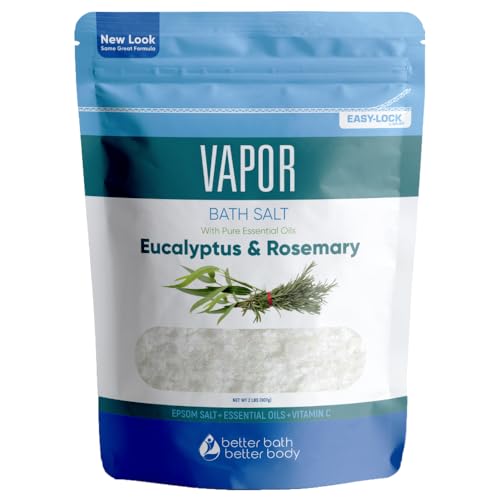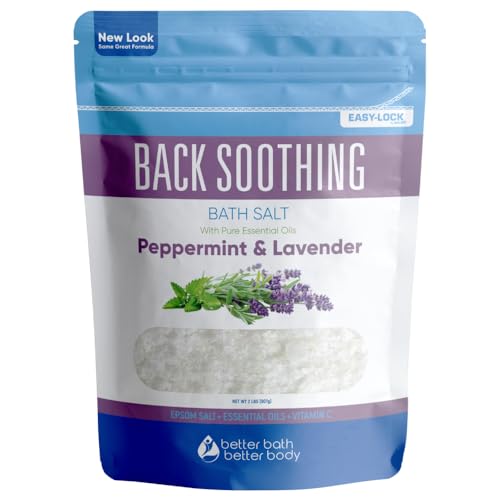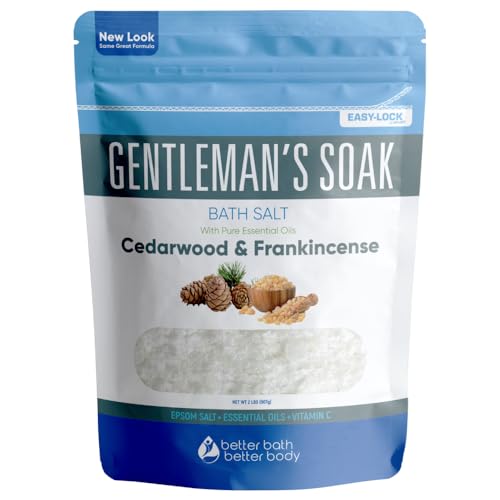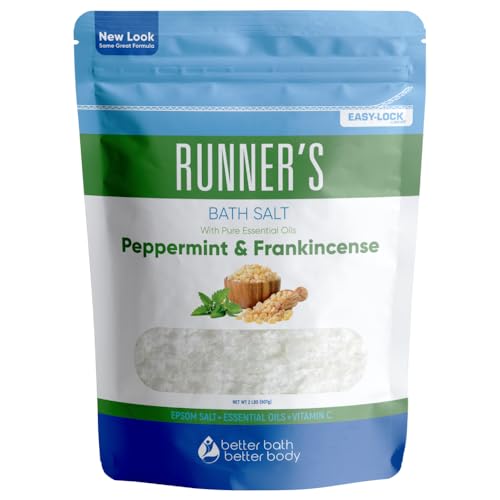




Runner's Bath Soak & Bubble Bath - Muscle Relief with Pure Essential Oils & Vitamin C - 32oz


Tocopherol, D Alpha
Low RiskTocopherol, specifically d-alpha tocopherol, is a naturally occurring form of Vitamin E. It is commonly used in cosmetic and personal care products primarily for its antioxidant properties, helping to protect formulations from oxidation and extend shelf life.
Sustai Insights
D-alpha tocopherol provides effective antioxidant benefits, contributing to product stability. It is sustainably sourced and generally regarded as safe, with low concerns regarding carcinogenicity, allergies, and reproductive toxicity. However, there are minor concerns about endocrine disruption. Regulatory bodies have not imposed significant restrictions, indicating low overall risk. Recommended usage practices include adhering to established safe concentration thresholds. Alternatives, such as other forms of Vitamin E or plant-based antioxidants, may also be considered.
Cymbopogon Citratus (Lemongrass)
Low RiskCymbopogon citratus, commonly known as lemongrass, is a plant used for its aromatic properties and as a flavoring agent in culinary applications. It is also utilized in various personal care products for its fragrance and potential skin benefits.
Sustai Insights
Lemongrass offers functional benefits such as antimicrobial properties and is often sustainably sourced, contributing to its appeal in eco-friendly products. While it presents low health risks related to carcinogenicity, allergies, and reproductive toxicity, there are concerns regarding enhanced skin absorption. Environmental impacts are minimal, with no significant pollutant or bioaccumulation concerns noted. Regulatory bodies currently impose no restrictions on its use. Overall, lemongrass is assessed as low risk, making it a safe choice in formulations.
Citrus Limon (Lemon) Peel
Low RiskCitrus limon (lemon) peel is derived from the outer skin of lemons and is commonly used in cosmetic formulations for its aromatic properties and potential skin benefits. It serves primarily as a fragrance agent and may also provide antioxidant effects.
Sustai Insights
Citrus limon (lemon) peel is valued for its aromatic contributions and potential antioxidant properties, which can enhance product appeal. It has a low risk of adverse health effects, including low concerns for carcinogenicity, allergies, and irritation. Environmental risks are minimal, with no significant evidence of bioaccumulation or pollution. Regulatory assessments indicate no restrictions on use. Overall, it is considered low risk, and safe usage practices should be maintained. Alternatives may include other citrus peels or natural fragrance compounds.
Fractionated Coconut Oil
Low RiskFractionated coconut oil is a refined version of coconut oil, where long-chain fatty acids are removed, leaving primarily medium-chain triglycerides. It is commonly used as a carrier oil in cosmetic products due to its lightweight texture and ability to penetrate the skin easily, making it suitable for moisturizing and massage applications.
Sustai Insights
Fractionated coconut oil offers functional benefits as an effective moisturizer and emollient, enhancing product texture and application. It is derived from sustainable sources and is biodegradable. Health risks are minimal, with low concerns for carcinogenicity, allergies, and reproductive toxicity. Environmentally, it does not present significant hazards. Regulatory assessments indicate no restrictions, supporting its low-risk profile. For safe usage, it is recommended to perform a patch test before extensive application. Alternatives include other lightweight oils such as jojoba or grapeseed oil, which may provide similar benefits.
Cymbopogon Flexuosus Oil
Low RiskCymbopogon flexuosus oil is a volatile oil obtained from the leaves of the Cymbopogon flexuosus plant. It is commonly used for its aromatic properties and as a flavoring agent in various products.
Sustai Insights
Cymbopogon flexuosus oil offers functional benefits such as fragrance and flavoring, with a low environmental impact due to its biodegradable nature. Health risks are minimal, with low concerns for carcinogenicity, allergies, and reproductive toxicity. Regulatory bodies have not issued significant warnings, maintaining a low overall risk level. Safe usage practices should be followed to mitigate any potential skin absorption issues. No widely recognized alternatives are noted, reinforcing its position as a low-risk ingredient.
Gaultheria Procumbens (Wintergreen) Leaf Extract
Low RiskGaultheria procumbens (wintergreen) leaf extract is derived from the leaves of the wintergreen plant. This extract is commonly used in personal care products for its potential soothing properties and characteristic fragrance. It is often included in formulations for its aromatic qualities and may contribute to product stability.
Sustai Insights
Gaultheria procumbens leaf extract is recognized for its functional benefits, including soothing properties and pleasant scent. It is sustainably sourced and shows low health risk concerns, with negligible potential for carcinogenicity, allergies, or reproductive toxicity. Regulatory assessments indicate it is not currently restricted. Environmental impact appears minimal, with no significant pollution or bioaccumulation concerns. Overall, this ingredient is considered low risk, making it a suitable choice in formulations. For those seeking alternatives, other botanical extracts may provide similar benefits.
Magnesium(ii), Sulfate, Heptahydrate
Low RiskMagnesium (II) sulfate, heptahydrate is an inorganic salt commonly used in various products, primarily as a drying agent, a laxative, and in bath salts for its muscle-relaxing properties. It is also utilized in agriculture as a nutrient source for plants.
Sustai Insights
Magnesium (II) sulfate, heptahydrate offers functional benefits such as effective hydration and muscle relaxation in topical applications. It is considered low risk for health concerns, including carcinogenicity and allergies, and is not currently restricted by regulatory bodies. Environmental risks are minimal, with no known pollutant or bioaccumulation potential. Overall, its safety profile is favorable, and it can be safely used in recommended concentrations. Alternatives include potassium sulfate for specific applications, though magnesium sulfate remains a widely accepted choice.
Melaleuca Alternifolia (Tea Tree)
Low RiskMelaleuca alternifolia, commonly known as tea tree, is an unspecified preparation derived from the leaves of the tea tree. It is primarily used for its antiseptic properties and is found in various personal care products.
Sustai Insights
Tea tree oil offers functional benefits such as antimicrobial properties, making it effective in skincare formulations. It is considered to have low health risks, including low concerns for carcinogenicity, allergies, and reproductive toxicity. Environmental risks are minimal, with no significant pollutant or bioaccumulation potential. Regulatory bodies have noted no major advisories, and overall risk assessment remains low. For safe usage, it is recommended to use appropriate concentrations and consider alternatives like lavender or eucalyptus oil for similar benefits.
Boswellia Sacra (Frankincense) Oil
Low RiskBoswellia sacra (frankincense) oil is derived from the resin of the Boswellia sacra tree. It is commonly used for its aromatic properties in incense and therapeutic applications. The oil is known for its potential benefits in skincare and traditional medicine, particularly in anti-inflammatory and analgesic formulations.
Sustai Insights
Boswellia sacra oil offers functional benefits such as anti-inflammatory and antimicrobial properties, making it valuable in skincare and aromatherapy. It is sustainably sourced and generally regarded as safe with low health risks, including minimal concerns for carcinogenicity or allergies. Environmental risks are low, with no significant pollutant potential or bioaccumulation reported. Regulatory agencies, including the FDA, have not indicated restrictions on its use. Overall, the risk level is low, and safe usage practices should be followed, with alternatives including other essential oils for similar benefits.
Mentha Piperita (Peppermint) Oil Extract
Low RiskMentha piperita (peppermint) oil extract is derived from the peppermint plant and is commonly used in various products for its aromatic and flavoring properties. It serves multiple functions, including acting as a fragrance agent and providing a cooling sensation in topical applications.
Sustai Insights
Mentha piperita oil offers functional benefits such as flavor enhancement and a refreshing aroma, while it is generally recognized as low risk for health concerns, including carcinogenicity and allergies. Environmentally, it does not contribute significantly to pollution or bioaccumulation. Regulatory bodies do not impose restrictions on its use. Safe usage practices include avoiding excessive exposure, particularly for sensitive individuals. Alternatives like spearmint oil may be considered, but overall, this ingredient is assessed as low risk.
Citrus Limon (Lemon)
Low RiskCitrus limon, commonly known as lemon, is a citrus fruit used primarily for its juice and zest. It is often included in personal care products for its astringent properties and as a natural fragrance. It is recognized for its potential antioxidant benefits and as a source of vitamin C.
Sustai Insights
Citrus limon offers functional benefits like acting as a natural preservative and providing fragrance in formulations. It is sustainably sourced and biodegradable. Health risks are considered low for carcinogenicity, allergies, and reproductive toxicity. Environmental risks are minimal, with no significant bioaccumulation. Regulatory status is favorable, with no current restrictions noted. Overall, this ingredient poses a low risk, making it a safe choice for consumers.
Cocos Nucifera (Coconut) Oil
Low RiskCocos Nucifera (Coconut) Oil is derived from the kernels of the coconut palm. It is primarily used in cosmetic formulations for its emollient and moisturizing properties, making it suitable for skin and hair care products.
Sustai Insights
Coconut oil serves as an effective moisturizer and emollient, promoting skin hydration and softness. It is sustainably sourced and biodegradable. Health risks are minimal, with low concerns regarding carcinogenicity, allergens, and reproductive toxicity. Environmental impact is also low, as it does not contribute significantly to pollution or bioaccumulation. Regulatory bodies have not issued restrictions on its use. Overall, coconut oil presents a low risk for health and environmental concerns, making it a safe ingredient in cosmetic products.
Leptospermum Scoparium (Manuka) Oil
Low RiskLeptospermum scoparium oil, commonly known as manuka oil, is a volatile oil extracted from the leaves and branches of the manuka tree. It is primarily known for its antimicrobial properties and is often used in cosmetics and personal care products for skin benefits.
Sustai Insights
Manuka oil offers functional benefits, including antimicrobial properties which can support skin health. It is generally considered to have low health risks, with minimal concerns regarding carcinogenicity, allergies, and irritation. Environmentally, it poses low risk as a pollutant and is not bioaccumulative. Regulatory assessments indicate no current restrictions, supporting its safety profile. Safe usage practices are advised, especially for sensitive populations. Alternatives may include other essential oils with similar properties. Overall, the risk associated with manuka oil is low.
Tocopherol, D Alpha
Low RiskTocopherol, specifically d-alpha tocopherol, is a naturally occurring form of Vitamin E. It is commonly used in cosmetic and personal care products primarily for its antioxidant properties, helping to protect formulations from oxidation and extend shelf life.
Sustai Insights
D-alpha tocopherol provides effective antioxidant benefits, contributing to product stability. It is sustainably sourced and generally regarded as safe, with low concerns regarding carcinogenicity, allergies, and reproductive toxicity. However, there are minor concerns about endocrine disruption. Regulatory bodies have not imposed significant restrictions, indicating low overall risk. Recommended usage practices include adhering to established safe concentration thresholds. Alternatives, such as other forms of Vitamin E or plant-based antioxidants, may also be considered.
Cymbopogon Citratus (Lemongrass)
Low RiskCymbopogon citratus, commonly known as lemongrass, is a plant used for its aromatic properties and as a flavoring agent in culinary applications. It is also utilized in various personal care products for its fragrance and potential skin benefits.
Sustai Insights
Lemongrass offers functional benefits such as antimicrobial properties and is often sustainably sourced, contributing to its appeal in eco-friendly products. While it presents low health risks related to carcinogenicity, allergies, and reproductive toxicity, there are concerns regarding enhanced skin absorption. Environmental impacts are minimal, with no significant pollutant or bioaccumulation concerns noted. Regulatory bodies currently impose no restrictions on its use. Overall, lemongrass is assessed as low risk, making it a safe choice in formulations.
Citrus Limon (Lemon) Peel
Low RiskCitrus limon (lemon) peel is derived from the outer skin of lemons and is commonly used in cosmetic formulations for its aromatic properties and potential skin benefits. It serves primarily as a fragrance agent and may also provide antioxidant effects.
Sustai Insights
Citrus limon (lemon) peel is valued for its aromatic contributions and potential antioxidant properties, which can enhance product appeal. It has a low risk of adverse health effects, including low concerns for carcinogenicity, allergies, and irritation. Environmental risks are minimal, with no significant evidence of bioaccumulation or pollution. Regulatory assessments indicate no restrictions on use. Overall, it is considered low risk, and safe usage practices should be maintained. Alternatives may include other citrus peels or natural fragrance compounds.
Fractionated Coconut Oil
Low RiskFractionated coconut oil is a refined version of coconut oil, where long-chain fatty acids are removed, leaving primarily medium-chain triglycerides. It is commonly used as a carrier oil in cosmetic products due to its lightweight texture and ability to penetrate the skin easily, making it suitable for moisturizing and massage applications.
Sustai Insights
Fractionated coconut oil offers functional benefits as an effective moisturizer and emollient, enhancing product texture and application. It is derived from sustainable sources and is biodegradable. Health risks are minimal, with low concerns for carcinogenicity, allergies, and reproductive toxicity. Environmentally, it does not present significant hazards. Regulatory assessments indicate no restrictions, supporting its low-risk profile. For safe usage, it is recommended to perform a patch test before extensive application. Alternatives include other lightweight oils such as jojoba or grapeseed oil, which may provide similar benefits.
Cymbopogon Flexuosus Oil
Low RiskCymbopogon flexuosus oil is a volatile oil obtained from the leaves of the Cymbopogon flexuosus plant. It is commonly used for its aromatic properties and as a flavoring agent in various products.
Sustai Insights
Cymbopogon flexuosus oil offers functional benefits such as fragrance and flavoring, with a low environmental impact due to its biodegradable nature. Health risks are minimal, with low concerns for carcinogenicity, allergies, and reproductive toxicity. Regulatory bodies have not issued significant warnings, maintaining a low overall risk level. Safe usage practices should be followed to mitigate any potential skin absorption issues. No widely recognized alternatives are noted, reinforcing its position as a low-risk ingredient.
Gaultheria Procumbens (Wintergreen) Leaf Extract
Low RiskGaultheria procumbens (wintergreen) leaf extract is derived from the leaves of the wintergreen plant. This extract is commonly used in personal care products for its potential soothing properties and characteristic fragrance. It is often included in formulations for its aromatic qualities and may contribute to product stability.
Sustai Insights
Gaultheria procumbens leaf extract is recognized for its functional benefits, including soothing properties and pleasant scent. It is sustainably sourced and shows low health risk concerns, with negligible potential for carcinogenicity, allergies, or reproductive toxicity. Regulatory assessments indicate it is not currently restricted. Environmental impact appears minimal, with no significant pollution or bioaccumulation concerns. Overall, this ingredient is considered low risk, making it a suitable choice in formulations. For those seeking alternatives, other botanical extracts may provide similar benefits.
Magnesium(ii), Sulfate, Heptahydrate
Low RiskMagnesium (II) sulfate, heptahydrate is an inorganic salt commonly used in various products, primarily as a drying agent, a laxative, and in bath salts for its muscle-relaxing properties. It is also utilized in agriculture as a nutrient source for plants.
Sustai Insights
Magnesium (II) sulfate, heptahydrate offers functional benefits such as effective hydration and muscle relaxation in topical applications. It is considered low risk for health concerns, including carcinogenicity and allergies, and is not currently restricted by regulatory bodies. Environmental risks are minimal, with no known pollutant or bioaccumulation potential. Overall, its safety profile is favorable, and it can be safely used in recommended concentrations. Alternatives include potassium sulfate for specific applications, though magnesium sulfate remains a widely accepted choice.
Melaleuca Alternifolia (Tea Tree)
Low RiskMelaleuca alternifolia, commonly known as tea tree, is an unspecified preparation derived from the leaves of the tea tree. It is primarily used for its antiseptic properties and is found in various personal care products.
Sustai Insights
Tea tree oil offers functional benefits such as antimicrobial properties, making it effective in skincare formulations. It is considered to have low health risks, including low concerns for carcinogenicity, allergies, and reproductive toxicity. Environmental risks are minimal, with no significant pollutant or bioaccumulation potential. Regulatory bodies have noted no major advisories, and overall risk assessment remains low. For safe usage, it is recommended to use appropriate concentrations and consider alternatives like lavender or eucalyptus oil for similar benefits.
Boswellia Sacra (Frankincense) Oil
Low RiskBoswellia sacra (frankincense) oil is derived from the resin of the Boswellia sacra tree. It is commonly used for its aromatic properties in incense and therapeutic applications. The oil is known for its potential benefits in skincare and traditional medicine, particularly in anti-inflammatory and analgesic formulations.
Sustai Insights
Boswellia sacra oil offers functional benefits such as anti-inflammatory and antimicrobial properties, making it valuable in skincare and aromatherapy. It is sustainably sourced and generally regarded as safe with low health risks, including minimal concerns for carcinogenicity or allergies. Environmental risks are low, with no significant pollutant potential or bioaccumulation reported. Regulatory agencies, including the FDA, have not indicated restrictions on its use. Overall, the risk level is low, and safe usage practices should be followed, with alternatives including other essential oils for similar benefits.
Mentha Piperita (Peppermint) Oil Extract
Low RiskMentha piperita (peppermint) oil extract is derived from the peppermint plant and is commonly used in various products for its aromatic and flavoring properties. It serves multiple functions, including acting as a fragrance agent and providing a cooling sensation in topical applications.
Sustai Insights
Mentha piperita oil offers functional benefits such as flavor enhancement and a refreshing aroma, while it is generally recognized as low risk for health concerns, including carcinogenicity and allergies. Environmentally, it does not contribute significantly to pollution or bioaccumulation. Regulatory bodies do not impose restrictions on its use. Safe usage practices include avoiding excessive exposure, particularly for sensitive individuals. Alternatives like spearmint oil may be considered, but overall, this ingredient is assessed as low risk.
Citrus Limon (Lemon)
Low RiskCitrus limon, commonly known as lemon, is a citrus fruit used primarily for its juice and zest. It is often included in personal care products for its astringent properties and as a natural fragrance. It is recognized for its potential antioxidant benefits and as a source of vitamin C.
Sustai Insights
Citrus limon offers functional benefits like acting as a natural preservative and providing fragrance in formulations. It is sustainably sourced and biodegradable. Health risks are considered low for carcinogenicity, allergies, and reproductive toxicity. Environmental risks are minimal, with no significant bioaccumulation. Regulatory status is favorable, with no current restrictions noted. Overall, this ingredient poses a low risk, making it a safe choice for consumers.
Cocos Nucifera (Coconut) Oil
Low RiskCocos Nucifera (Coconut) Oil is derived from the kernels of the coconut palm. It is primarily used in cosmetic formulations for its emollient and moisturizing properties, making it suitable for skin and hair care products.
Sustai Insights
Coconut oil serves as an effective moisturizer and emollient, promoting skin hydration and softness. It is sustainably sourced and biodegradable. Health risks are minimal, with low concerns regarding carcinogenicity, allergens, and reproductive toxicity. Environmental impact is also low, as it does not contribute significantly to pollution or bioaccumulation. Regulatory bodies have not issued restrictions on its use. Overall, coconut oil presents a low risk for health and environmental concerns, making it a safe ingredient in cosmetic products.
Leptospermum Scoparium (Manuka) Oil
Low RiskLeptospermum scoparium oil, commonly known as manuka oil, is a volatile oil extracted from the leaves and branches of the manuka tree. It is primarily known for its antimicrobial properties and is often used in cosmetics and personal care products for skin benefits.
Sustai Insights
Manuka oil offers functional benefits, including antimicrobial properties which can support skin health. It is generally considered to have low health risks, with minimal concerns regarding carcinogenicity, allergies, and irritation. Environmentally, it poses low risk as a pollutant and is not bioaccumulative. Regulatory assessments indicate no current restrictions, supporting its safety profile. Safe usage practices are advised, especially for sensitive populations. Alternatives may include other essential oils with similar properties. Overall, the risk associated with manuka oil is low.
Discover the Runner's Bath Salt, a rejuvenating blend designed specifically for runners. This 32-ounce Epsom salt soak combines natural essential oils and Vitamin C to soothe tired muscles and enhance your bathing experience. Perfect for post-run recovery, this bath soak not only revitalizes but also cares for your skin, making it an ideal gift for fitness enthusiasts.
- Muscle Recovery: Epsom salt and therapeutic essential oils work together to relieve muscle tension and promote relaxation.
- Natural Ingredients: Formulated with USP-grade Epsom salt, pure essential oils, and Vitamin C crystals, free from synthetic fragrances and dyes.
- Refreshing Aromatherapy: The invigorating scents of peppermint, tea tree, and lemongrass create a calming atmosphere, enhancing your bathing ritual.
- Skin-Friendly: Vitamin C crystals help neutralize impurities in bath water, adding an extra layer of care for your skin.
- Ethically Sourced: Proudly made in the USA with natural ingredients sourced responsibly, packaged in a BPA-free, easy press-lock pouch for convenience.
Subscribe & Save with Sustai
- Best Price Guarantee: Always enjoy the lowest prices on sustainable home essentials.
- No Surprises: We’ll notify you before shipping. No hidden fees, ever.
- You’re in Charge: Change, pause, or cancel your subscription anytime with ease.
- Eco-Friendly Deliveries: Our grouped shipments mean less packaging and lower emissions.
Join us on a sustainable journey. Special offers for a limited time! Prices and promotions may change.
Recommended Products
Discover the Runner's Bath Salt, a rejuvenating blend designed specifically for runners. This 32-ounce Epsom salt soak combines natural essential oils and Vitamin C to soothe tired muscles and enhance your bathing experience. Perfect for post-run recovery, this bath soak not only revitalizes but also cares for your skin, making it an ideal gift for fitness enthusiasts.
- Muscle Recovery: Epsom salt and therapeutic essential oils work together to relieve muscle tension and promote relaxation.
- Natural Ingredients: Formulated with USP-grade Epsom salt, pure essential oils, and Vitamin C crystals, free from synthetic fragrances and dyes.
- Refreshing Aromatherapy: The invigorating scents of peppermint, tea tree, and lemongrass create a calming atmosphere, enhancing your bathing ritual.
- Skin-Friendly: Vitamin C crystals help neutralize impurities in bath water, adding an extra layer of care for your skin.
- Ethically Sourced: Proudly made in the USA with natural ingredients sourced responsibly, packaged in a BPA-free, easy press-lock pouch for convenience.

You can have at most 2 Sustainable Steals products in your cart
Customer Reviews
Customers’ View
Customers appreciate the soothing properties and natural formulation of the Bath Salt, which includes Epsom salt and essential oils designed to alleviate muscle soreness. Many users highlight the product's effectiveness in enhancing post-exercise recovery, with one customer noting a significant reduction in soreness after a long run. The pleasant scent and calming experience are frequently praised, making it a favorite for relaxation after workouts. Additionally, the eco-friendly packaging is valued by those who prioritize sustainable choices. Overall, customers find this bath soak a beneficial addition to their self-care routines that aligns with their health-conscious and environmentally friendly values.
AI-generated from the text of customer reviewsThis product has no reviews yet.




